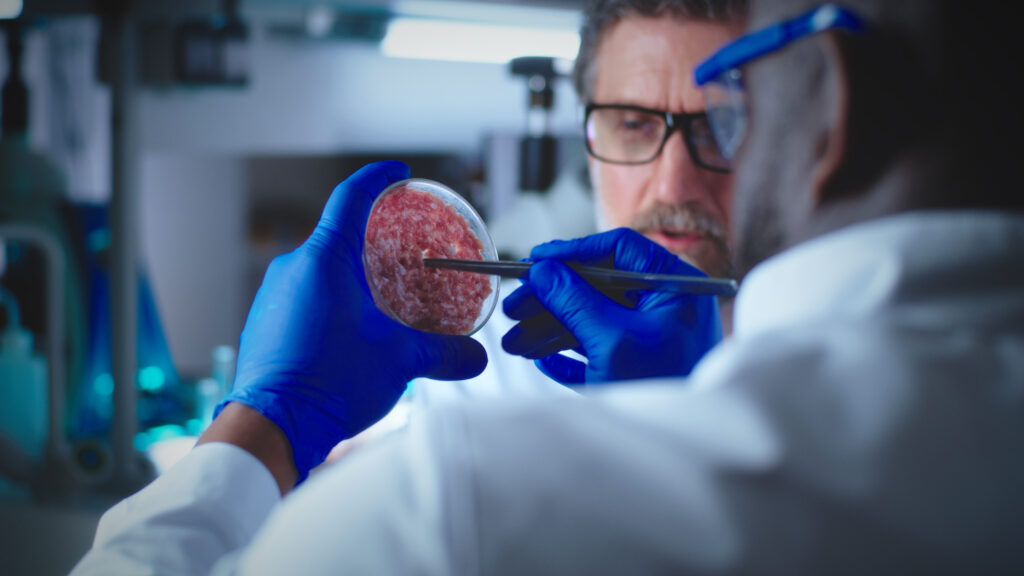The UK’s Food Standards Agency (FSA) is exploring ways to fast-track approval for lab-grown foods, with the possibility of products like lab-grown meat, dairy, and sugar hitting the market within the next two years. If the initiative is approved, it would mark the first time lab-grown food is legally available for human consumption in the country. The FSA’s efforts aim to streamline regulations while maintaining strict safety standards, with the goal of boosting innovation within the UK food sector.
Lab-grown food is produced by cultivating cells in controlled environments, often through the use of small chemical plants. UK-based companies have led the charge in developing this technology but have expressed concerns that the current approval process is delaying their progress. Last month, a significant milestone was achieved when dog food made from factory-grown meat appeared on UK shelves, demonstrating the potential of lab-grown food products.
Global Trends and Regulatory Roadblocks
Lab-grown meat made headlines globally in recent years, with Singapore becoming the first country to approve cell-cultivated meat for human consumption in 2020. The United States followed suit in 2023, and Israel is expected to approve it in 2024. However, some regions, including Italy and US states like Alabama and Florida, have imposed bans on lab-grown meat, citing health and ethical concerns.
In response to international developments, the FSA is working alongside industry experts and researchers to create new regulations that would make it easier to bring lab-grown food to market. The agency aims to complete safety assessments for two lab-grown food products within the next two years. While this progress is seen as a positive step by many, critics argue that involving food companies in the regulatory process could lead to conflicts of interest.
UK businesses involved in lab-grown food production are concerned that the lengthy approval process could leave them trailing behind their international competitors. However, FSA chief scientist Professor Robin May reassures the public that consumer safety will remain a top priority. “We are working closely with companies and academics to create a regulatory system that serves both innovation and safety,” he said.
Industry Challenges and Innovation at Risk
Despite assurances from the FSA, some industry leaders are concerned about the pace of progress. Professor May’s comments have not alleviated the worries of UK firms who fear they may lose their competitive edge due to slow regulatory timelines. The CEO of Ivy Farm Technologies, a leading lab-grown food company based in Oxford, Dr. Harsh Amin, emphasized the urgency of reducing approval times. “Waiting two years for approval is too long. Reducing the process to under a year, while upholding Britain’s highest food safety standards, would help start-ups thrive,” said Dr. Amin.
At Imperial College’s Bezos Centre, Dr. Alicia Graham is working on an innovative lab-grown sugar alternative by introducing a berry gene into yeast to produce sweet crystals. However, her company, MadeSweetly, is unable to sell its product until it receives regulatory approval.
Economic and Environmental Impact of Lab-Grown Food
Lab-grown food offers many potential benefits, including a reduced environmental impact and improved public health. Supporters of lab-grown food argue that these products are more sustainable than traditional farming methods, requiring fewer resources and producing less waste. Additionally, they could help reduce the need for animal farming, which contributes to greenhouse gas emissions and deforestation.
The UK government is keen to support lab-grown food companies, hoping they will create jobs and contribute to economic growth. Yet, some critics question the sustainability of lab-grown foods, arguing that they may require significant amounts of energy and may not be as healthy as advertised. “These are ultra-processed foods,” said Pat Thomas from Beyond GM. “At a time when we encourage people to eat fewer processed foods, their introduction raises concerns.”
Looking Ahead: The Future of Lab-Grown Food in the UK
The FSA’s commitment to evaluating lab-grown food products within two years is a positive sign for the future of this emerging industry in the UK. Professor May stresses the importance of ensuring that safety is at the heart of the regulatory process. “Our goal is to make sure that scientific understanding drives our decisions to protect consumers,” he said.
However, as the debate continues over the health, environmental, and economic implications of lab-grown food, it is clear that many questions remain. Will lab-grown food become a common part of the UK diet? Or will concerns about health, energy use, and sustainability prevent widespread adoption?
For now, the future of lab-grown food in the UK remains uncertain, but the next few years will likely bring important developments in both the regulatory process and public perception of this innovative food source.
For more updates on the lab-grown food industry and other emerging technologies, visit Wealth Magazine


